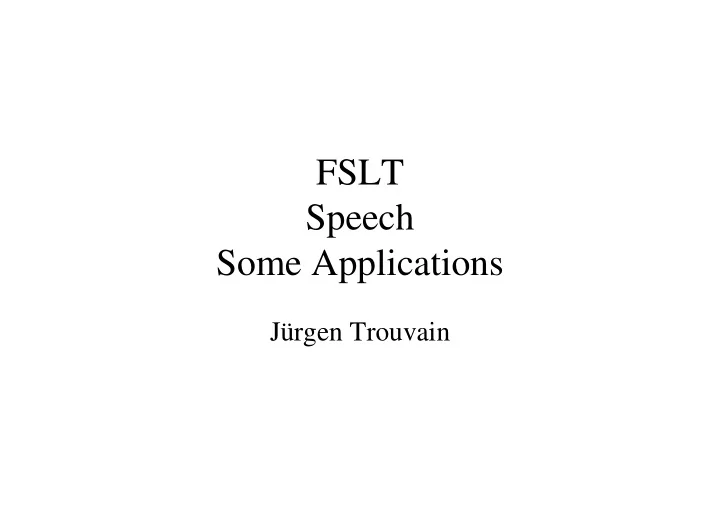

FSLT Speech Some Applications Jürgen Trouvain
Symbolic Annotations & Dictionaries • Pronunciation dictionaries – language learner – language researchers (dialectology, for experimental set-ups, diachronic comparisons) – professional speakers (e.g. from media) – speech technology (synthesis & recognition) • Annotation of speech corpora – searchable databases – segmental and prosodic symbols combined with linguistic and multi-modal events
Language Learning • electronically available teaching material – symbolic representations – audio files – computer-animated visualisations • computer-assisted pronunciation training – part of CALL ( comp.-assisted language learning ) – diagnosis tools such as evaluation of fluency
Medical Applications • Databases – databases with pathological and healthy voices ( e.g. www.coli.uni-saarland.de/stimmdatenbank ) • Diagnosis of speech pathologies – tools for measurements e.g.electropalatography, electroglottography – software specialised for voice pathologies • Therapeutical support – tools for visualisation and feedback control of articulation, e.g. immediate pitch tracking, SpeechTrainer
Speaker Recognition • Forensic phonetics – speaker recognition by comparing voices of two recordings – speaker authentification • Biometrical applications – speaker verification as user-specific access – often combined with other biometrical data • Dialogue systems – speaker classification (e.g. age group)
Speech Synthesis • see Marc Schröder's slides :-) • various application scenarios – limited domain speech output (e.g. talking clocks, public transport information, language tutor) – unlimited text-to-speech (e.g. car navigation, for the blind, SMS-to-speech, in computer games) – speech output in dialogue systems (e.g. in call- centers, time-table information, in-car-control of information services )
Automatic Speech Recognition • see slides of Dietrich Klakow
Automatic Dialogue Systems • see speech synthesis slides • main problems – user adaptivity – unnatural speaking – "no fun"-experience
Examples for own research • Using speech and language technology – ultra-fast synthetic speech as used by blind • Useful for speech and language technology – Talk-in-interaction vs. read speech More information: www.coli.uni-saarland.de/~trouvain
Recommend
More recommend